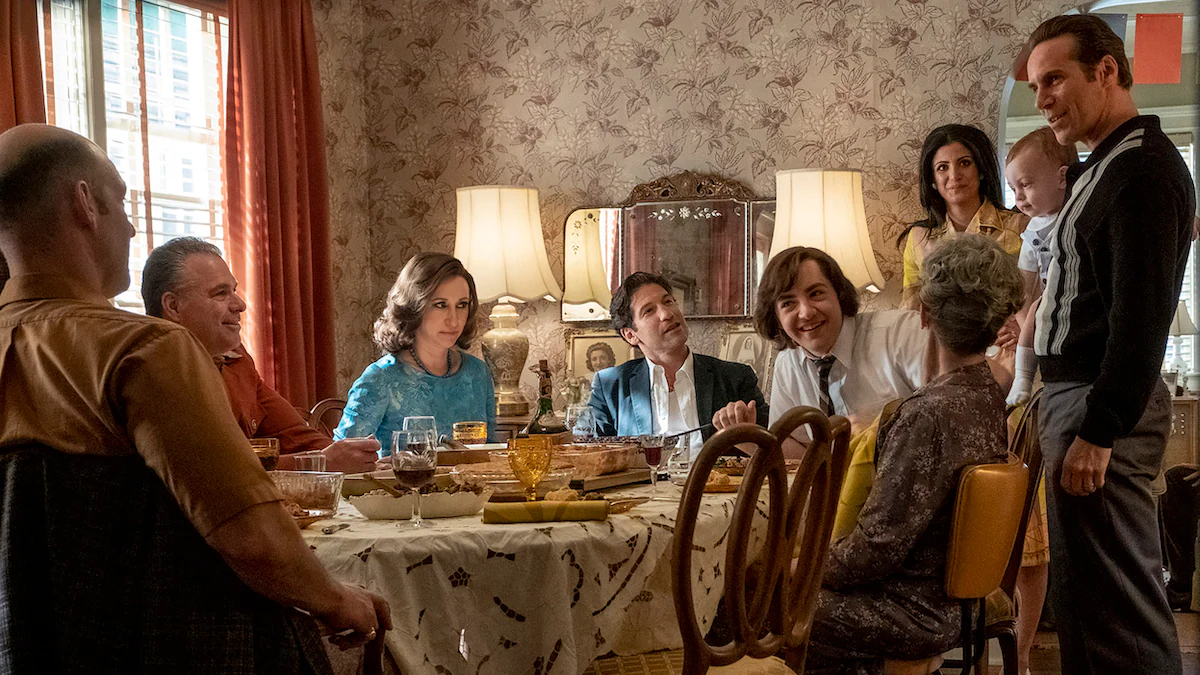At the end of the first season of Poldark, Ross Poldark (Aiden Turner) and his wife Demelza (Eleanor Tomlinson) held each other on the cliffs of Cornwall, staring out at the sea with the promise of working through their personal tragedy — before Ross is carried away by Redcoats and taken in for trial for crimes that he did not commit.
In this season’s Nov. 27 finale, they’re in the same embrace on the same cliffs with a similar unspoken promise to one another — but there isn’t the hope that accompanied the previous season, even with the cliffhanger of his arrest. They have more to work through this time and although there’s the expectation that they’ll survive, it’s not nearly as certain.
RELATED: ‘Poldark’ is where ‘Outlander’ & ‘Downton Abbey’ meet
With so many characters and subplots developing throughout the season, even Aunt Agatha’s (Caroline Blakiston) foreboding Tarot card predictions fall short of the dynamic heartbreak that takes place in this episode. But there is nothing that really qualifies as “foreshadowing” in Poldark, as every move has consequences and no scene is ever extraneous. Suddenly and succinctly, everything that happened previously in the season had consequence in the finale.
The penultimate episode showed signs of brightness to be sure, as Ross’s new mine struck tin and he was finally back in his lucrative family business. In the opening scenes of the finale, he’s paying out his struggling villagers — truly excited at paying his workers and thereby fulfilling his promise to them, which is one of Poldark’s finest qualities.
The relationship Ross cultivates with the common people of his county are at the heart of what makes Ross Poldark an inherently good character; for all his flaws, a modern audience knows he is on the right side of history and his heart is in the right place. There is pure joy, and a payoff (both literal and figurative) that has been building over two seasons of industrial struggle.
The depiction of the actual work of mining in the 18th Century is extremely important in setting apart the Poldark narrative from staunch, historical stories that exclusively focus on aristocracy — and the audience cares for the welfare of the workers just as much as Ross Poldark does. With Aidan Turner’s gorgeous hair and Ross’s commitment to the common man, he’s pretty much infallible even when he makes the most boneheaded mistakes.
But as quickly as things were looking up, they start to roll downhill when George Warleggan (a menacing Jack Farthing) sends Ross a letter, letting him know that he’s been looking into the mine and wants to “discuss its acquisition.” Wheal Grace was previously completely unproductive, and purchased effectively as a roundabout way of helping Elizabeth (Jill Townsend) maintain a home in the wake of her husband’s death — but Warleggan has designs to seize it back. Under the thin guise of looking out for his newly adopted son, Warleggan threatens to smear Ross’s name and intentions if he doesn’t return the mine.
Ross threatens violence — and then delivers, in a spectacular fight scene that ended with a few satisfying moments of Warleggan held extremely close to a roaring fire. Unfortunately, nothing can ever be truly satisfying on Poldark, so the villain survives and the mine remains in Ross’s possession for now. It’s always “for now” when the antagonist is an obsessive creep.
Meanwhile, Doctor Dwight Enys (Luke Norris) is told by his ill-informed and unfortunately diabetic patient, Ray Penvenen (Jon Nettles), that his niece and Enys’s former flame, Caroline Penvenen (Gabriella Wilde) has been engaged to another man. In another spectacular display of poor decision making, Enys immediately reenlists with the British Army without even pausing to fact-check Uncle Penvenen.
When the Poldarks are informed of his decision, Ross — moody because his wife is still upset that he slept with his childhood sweetheart –decides that joining the Army sounds like a great idea, since he used that as an excuse to run from his problems once before and that clearly worked out so well.
RELATED: ‘Miss Fisher’s’ sexual revolution is new — and crucial
Demelza, on the other hand, is having none of this. Even for a character who is inherently iconoclastic, Demelza is holding things together and making her decisions quite well. In an episode motivated by short-sightedness, she seems to be the only one who has a plan and a destination in mind for the bulk of the episode. She’s a renegade who never hears “no” unless she’s saying it herself — which she did in the penultimate episode, when she refused to sleep with her Redcoat soldier because she couldn’t bring herself to betray her husband.
As she is not particularly thrilled by the idea of Ross leaving the family after cheating on her with Elizabeth, Demelza throws her indiscretion at him, earning a hypocritical “I do not admire you for this.” Ross proceeds to defend his affair as though it were the epitome of an ethereal, mythic fable of provincial affection, while Demelza’s dalliance was base and grotesque because it didn’t have the long and illustrious background that his did. It’s a boneheaded thing to say, at the very least.
The next day, Ross goes out to thank Caroline for secretly helping his business by reuniting her with Enys, and then decides not to pursue another military adventure after all. Demelza visits Verity and then meets Elizabeth at the spot where she planned Verity’s escape in Season 1, and delivers a scathing critique of Elizabeth for what she has done to her marriage.
To her credit, at no point does Demelza allow Elizabeth any benefit of kindness and tells her — rightfully — that she damaged her marriage and that she is barely capable of making a decision on her own. It’s true, Elizabeth’s character is often heavily influenced by the last person she spoke to, and she rarely does anything that isn’t motivated by some feeling of guilt or indebtedness. Demelza declares her intention to leave her husband and takes off to go pack, but gets shot by one of Warleggan’s servants while hopping a fence.
When she gets home, she tells the house servants, Prudie and Judd (Beatie Edney, Phil Davis) — but strongly instructs them to not tell Ross. Makes sense, but these two are not particularly interested in keeping it quiet, so Judd heads into town and riles up the community to take vengeance on Warleggan for literally shooting at their lady. This is where the result of Ross’s devotion to the town really culminates, as in the finale of Season 1 when he gathers the town to collect the goods from the Warleggan shipwreck. They love him, will follow him to whatever end, and are by extension fiercely protective of his household.
As Demelza is effectively a symbol of his commitment to the county, she embodies their relationship, so they take more than personal offense when she’s injured by a rival family. The town marches with torches toward Trenwith — but Demelza gets to the house first. She runs into the dining room, and in a scene that recalls the time that she offered Francis an apology for Verity’s elopement, she pleads with Warleggan and Elizabeth to board up their house or try to run away, but he refuses to listen. Instead of being rational or even slightly thankful, Warleggan just dismisses her with his typical pretentious flourish and she runs outside to try to persuade the angry mob to turn around.
Looking down through the balcony window, Elizabeth sees Demelza, surrounded by flames, standing behind the townspeople as they move closer in on what was once an idyllic, aristocratic paradise. Of course, as the mob approaches and the five, well-armed Warleggan men stand between them and Trenwith, Ross the Hero swoops in at the last moment to stare down Warleggan and call off the townspeople.
RELATED: ‘Indian Summers’ is a worthy & necessary ‘Downton Abbey’ heir
With all of the engaging personal plotlines and heated romantic twists, it’s easy to forget the overarching theme of “Poldark”: At its core, it’s about a renegade aristocrat leading common people through their trial and hardship in a quickly changing world. Here, this plays out visually. Warleggan is motivated by his commitment to a world of aristocratic power that is increasingly falling apart, a world he isn’t even really a part of since his family line is that of nouveau-riche bankers and not bloodline lordship. He’s not just an antagonist, but a perfect foil to Ross Poldark, the man who comes from an upper-class but rejects the excess and abuses of that society.
The climax of the finale visually draws this divide: Ross is on the correct side in this conflict and the people in numbers have greater power than the few. As Ross points out to Warleggan, he could easily call them back to destroy Trenwith but he generously chose peace instead. This is the benevolent hero of the masses that viewers adore and the very reason that he maintains his status as a lovable but flawed hero, despite his indiscretions with Elizabeth.
And Ross Poldark is aware that his flaws are an important facet of his integrity, which he points out to Demelza in the following scene. An idealized, aristocratic lifestyle with a fairy tale romance is perfect in concept, but real life is imperfect, and mistakes can earn dire consequences. Ross humbles himself, pleading with a determined Demelza, who eventually gives in and agrees to stay with Ross. It’s not a perfect happy ending, either.
As Aunt Agatha tells Elizabeth her pregnancy will culminate earlier than she expects — meaning that the child is likely Ross’s and not George’s — we’re left with dread of what that will mean for Ross and Demelza. There isn’t very much confidence that things will truly get better, as they hold each other on the cliffs of Cornwall and look out into the sea.
Source link



 Movies News6 years ago
Movies News6 years ago


 Movies News4 years ago
Movies News4 years ago


 Movies News4 years ago
Movies News4 years ago


 Movies News4 years ago
Movies News4 years ago












